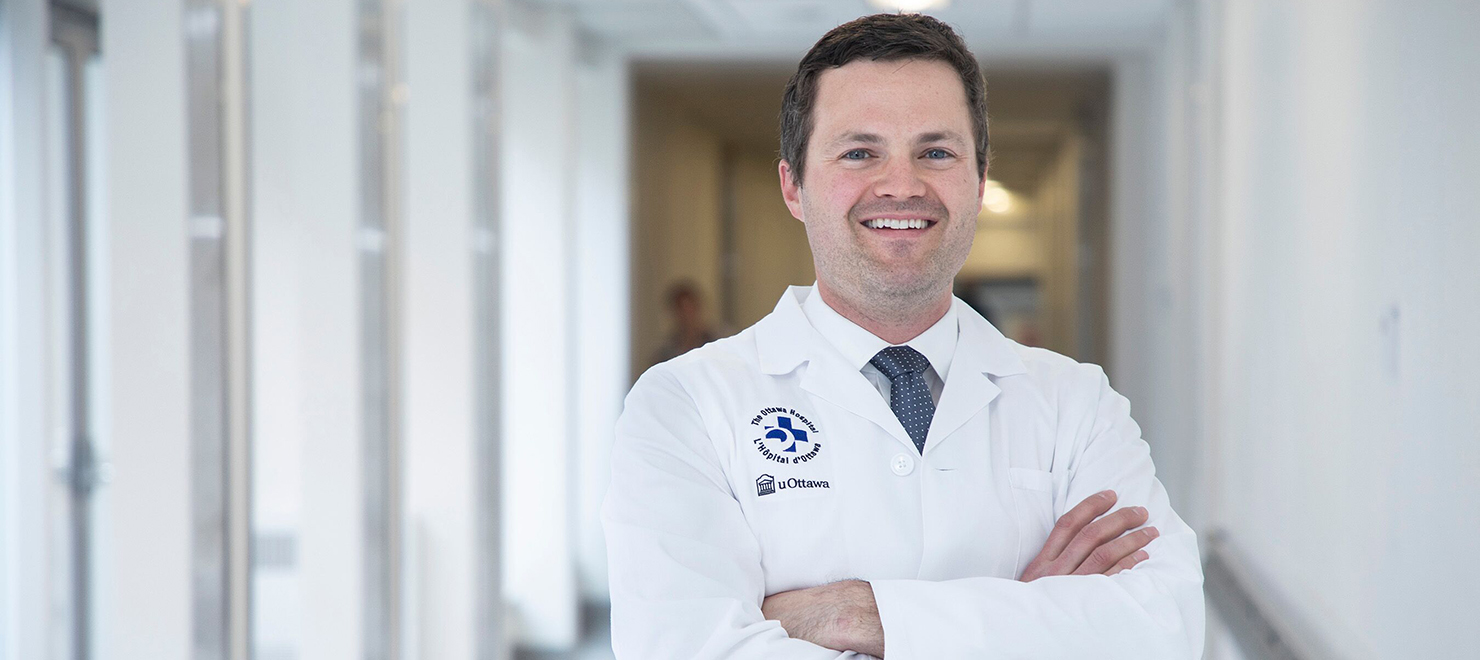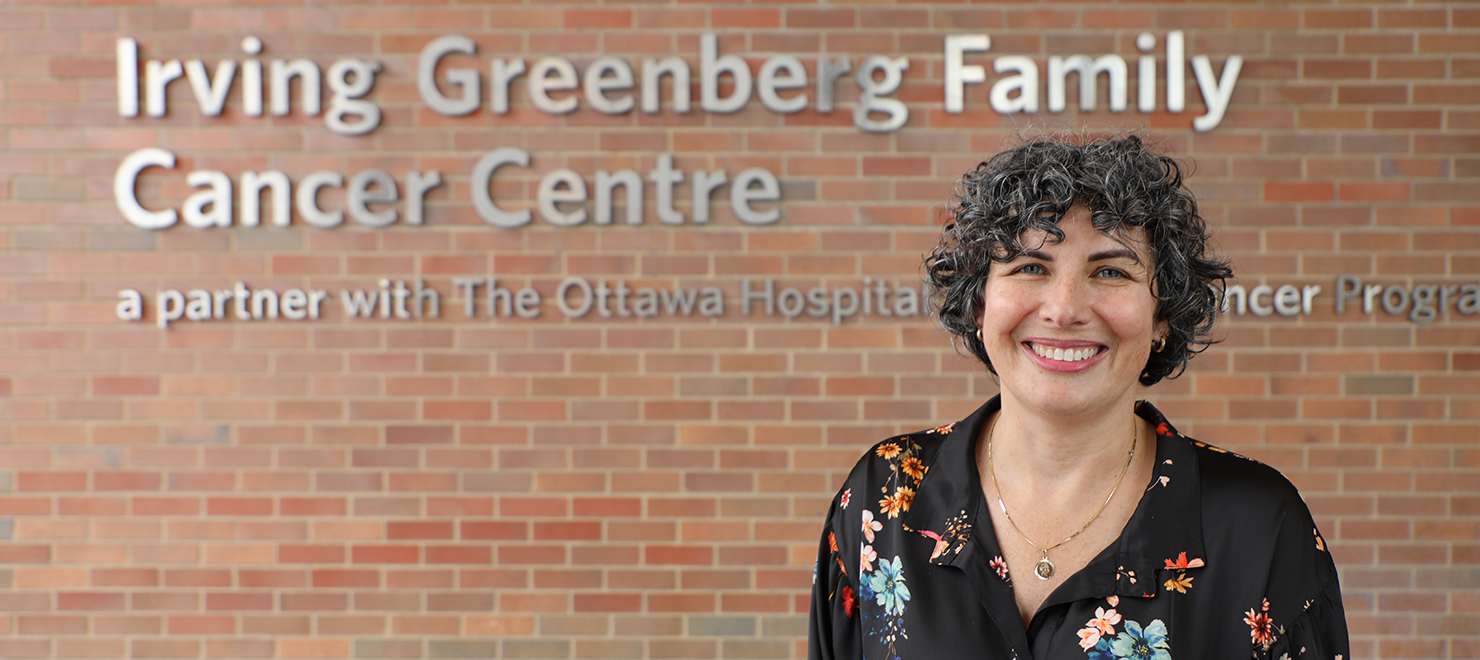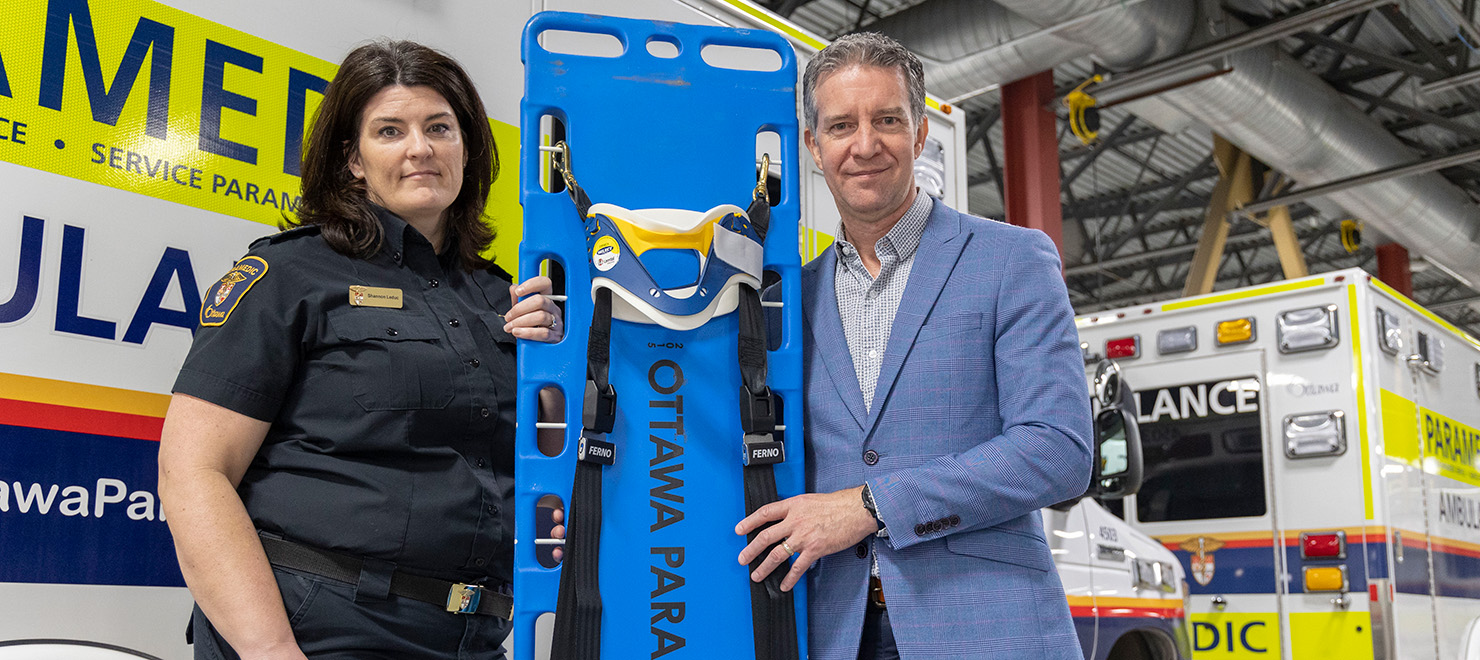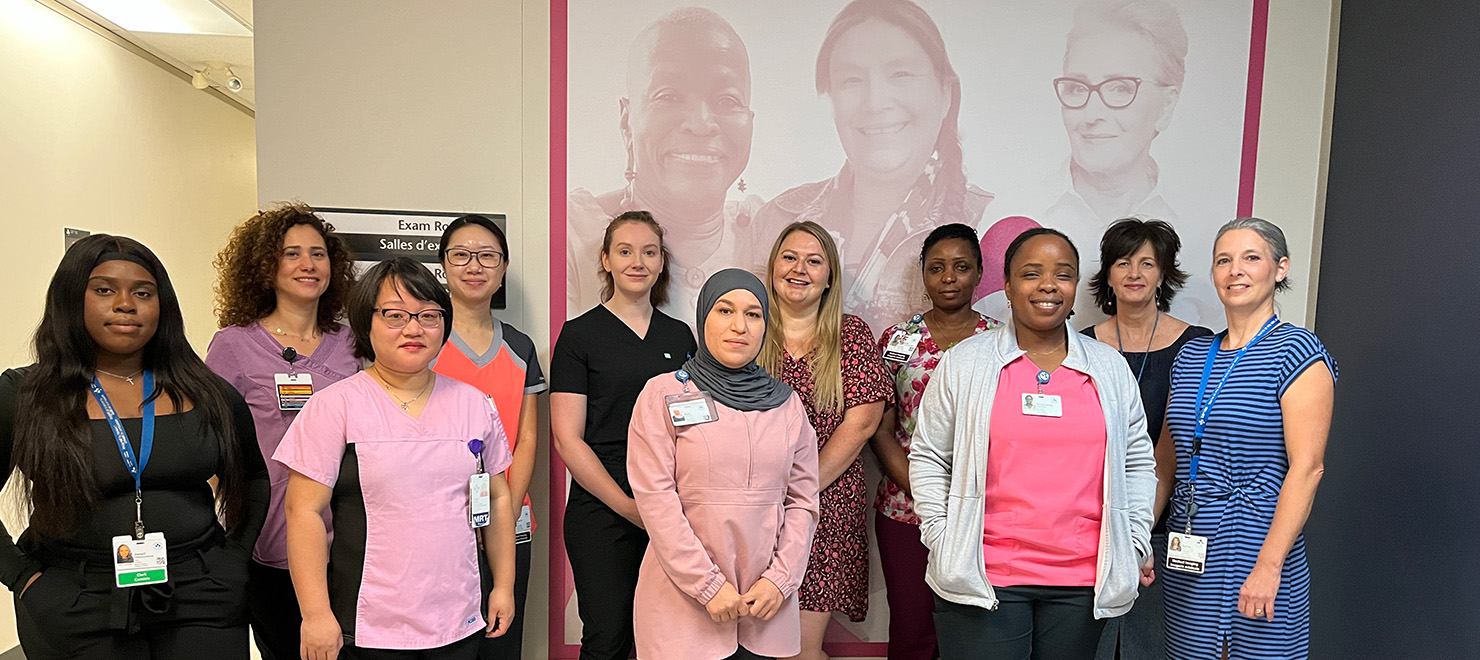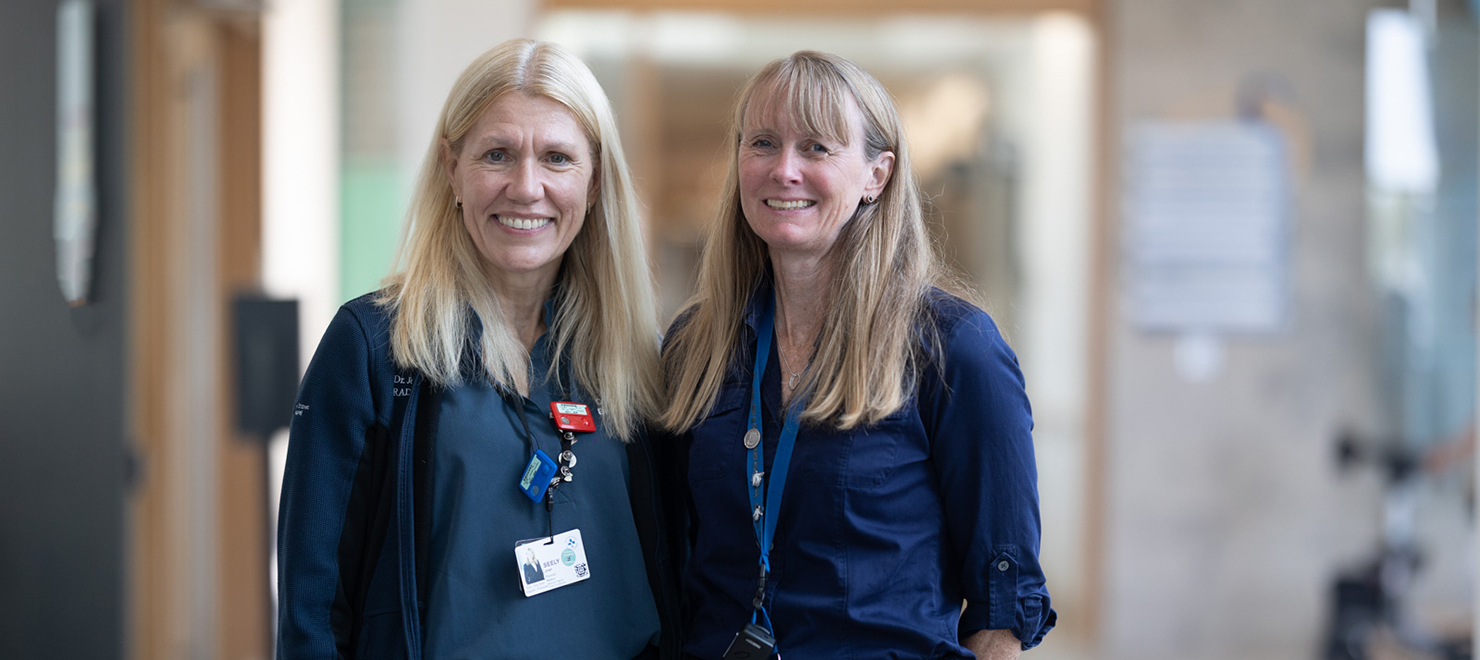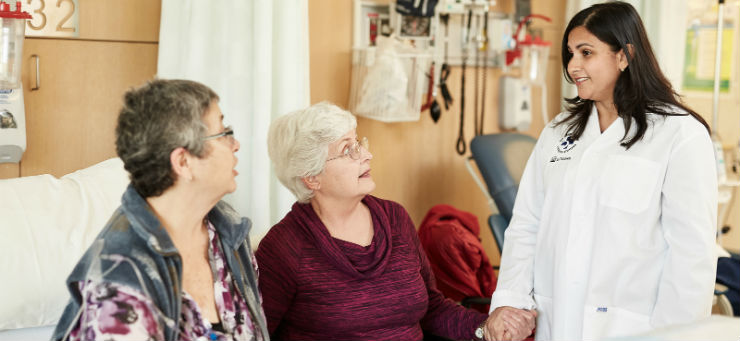
Patient Cathy Chapman (left) and her sister, Enid Holohan, discussed her clinical trial treatment with Clinical Research Coordinator Saara Ali (right).
Chemotherapy wasn’t working for Cathy Chapman. However, a genetic test identified a specific gene mutation that meant she could take part in a new cancer drug trial.
Chapman was diagnosed with colon cancer in February 2017. She began chemotherapy at The Ottawa Hospital’s satellite clinic in Pembroke, since she lives in Deep River. However, the chemotherapy did nothing but give her side effects. The cancer continued growing, so her treatment stopped in April 2017.
Meanwhile, The Ottawa Hospital’s Molecular Oncology Diagnostics Laboratory analyzed Chapman’s tumour and identified a gene mutation that offered another treatment option. Only about five percent of colon cancers have this mutation. Dr. Bryan Lo, director of the molecular lab, flagged the mutation to Chapman’s oncologist, Dr. Rachel Goodwin.
Dr. Goodwin knew about an upcoming international clinical trial at The Ottawa Hospital Cancer Centre for a drug that was having great success with Chapman’s specific sub-type of colon cancer. The drug was designed to block the mutation and slow down the cancer growth.
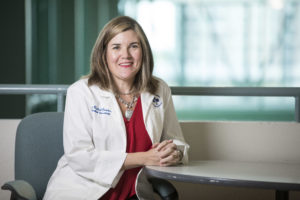
Oncologist Dr. Rachel Goodwin identified a clinical trial that would treat Cathy Chapman’s rare type of colon cancer.
Chapman was the first patient in Canada on this international trial.
In 2016, the molecular lab began analyzing the genetic makeup of colon cancer tumours using its new Next Generation Sequencer (purchased entirely with donor support). By identifying the genetic makeup of each person’s individual tumour, oncologists can tailor the cancer treatment to be more effective for them.
“When we get the genetic sequencing report back for a colon cancer patient, we might see that the patient has a gene mutation that could make their cancer susceptible to a drug we never would have considered, like a kidney cancer drug, or to a new drug,” said Dr. Goodwin. This was the case with 60-year-old Chapman.
“Because there is currently no drug being used as a standard of care for her type of colon cancer, Cathy could get the drug only on a trial,” said Dr. Goodwin. “That is why we take the efforts to open new trials here with new drugs to provide patients like Cathy with up and coming treatments.”
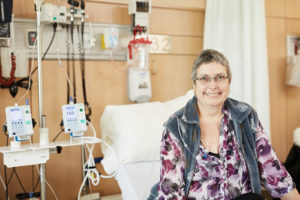
Cathy Chapman visits The Ottawa Hospital Cancer Centre for weekly treatments as part of a clinical trial.
“Cathy wasn’t doing so well on her other treatments, so the timing was perfect that this trial was coming up,” said Saara Ali, Clinical Research Coordinator. “Thanks to the molecular testing done by Dr. Lo and the networking between him, Dr. Goodwin, and myself, we were able to put forward this new patient for this clinical trial as a treatment option.”
“I was randomized into the trial, which gives me multiple drugs,” said Chapman, who drives to the Cancer Centre at the General Campus once a week for treatment. “Within several doses, the CT scan showed a reduction in my cancer. The tumour shrank 40 percent after I was on the clinical trial for seven weeks. In December, a CT scan showed it had shrunk 63 percent.”
“She’s at full dose and doing well on it,” said Ali. “As long as she is benefitting, the drugs will be provided for her through the clinical trial.”
The molecular lab is prepared to identify mutations in the genetic profile of other patients with this rare mutation, so they might also take part in the trial and benefit from trying innovative and untested therapies.
The Ottawa Hospital is raising funds that are critical for research studies and clinical trials in order to bring better treatments to patients as soon as they are available.

Support patient care and research at
The Ottawa Hospital
You might also like…
Do you have a surgery coming up? Here are five “prehab” tips to help you recover faster
You’ve probably heard about rehabilitation, but what about “prehabilitation”? Prehab is all about getting your body and mind in top shape before surgery so you can enjoy a smoother, quicker recovery. Discover five essential prehab strategies from researcher Dr. Daniel McIsaac.
“My story doesn’t have to be your story”: New screening test better at preventing cervical cancer
“I went from being a 32-year-old new mom to a cancer patient with an incurable diagnosis.” Alicia’s journey underscores the critical role of HPV testing in preventing cervical cancer. Discover how the new HPV test can save lives and find out how to book your cervical screening appointment with our “Superscreener.”
By thinking differently, this research team is improving the lives of people with cancer
Taking a different approach to clinical trials, the REthinking Clinical Trials (REaCT) program aims to answer some of the most important and practical questions that affect both patients with cancer and our health-care system. Find out what sets REaCT apart and makes the program so special to participants like Beth.
Does this backboard look comfortable to you?
Imagine this: You’re flat on your back, strapped tight to a rigid backboard, unable to move at all. Fortunately, this is no longer the reality for most low-risk trauma patients when they’re brought to hospital in our province. Find out how researchers at The Ottawa Hospital teamed up with paramedics across Ontario to make the journey a lot more comfortable.
Breast cancer screening at The Ottawa Hospital: What to expect from your mammogram appointment
Is it time for your regular mammogram? Meet the team at The Ottawa Hospital’s Hampton Park Plaza breast screening clinic. When you book your screening mammogram with us, you can expect compassionate service and an efficient appointment (most people are in and out in under 20 minutes!).
Ontario lowers age for regular breast cancer screenings: Top 13 frequently asked questions
To help detect and treat breast cancer as early as possible, the province has lowered the minimum age to self-refer for publicly funded screenings — from 50 to 40. Eligible Ontarians between 40 and 49 can make an appointment for a routine screening mammogram without a referral from a primary care provider. Here are the most important things that our breast screening team wants you to know.


 To reset, hold the Ctrl key, then press 0.
To reset, hold the Ctrl key, then press 0.
